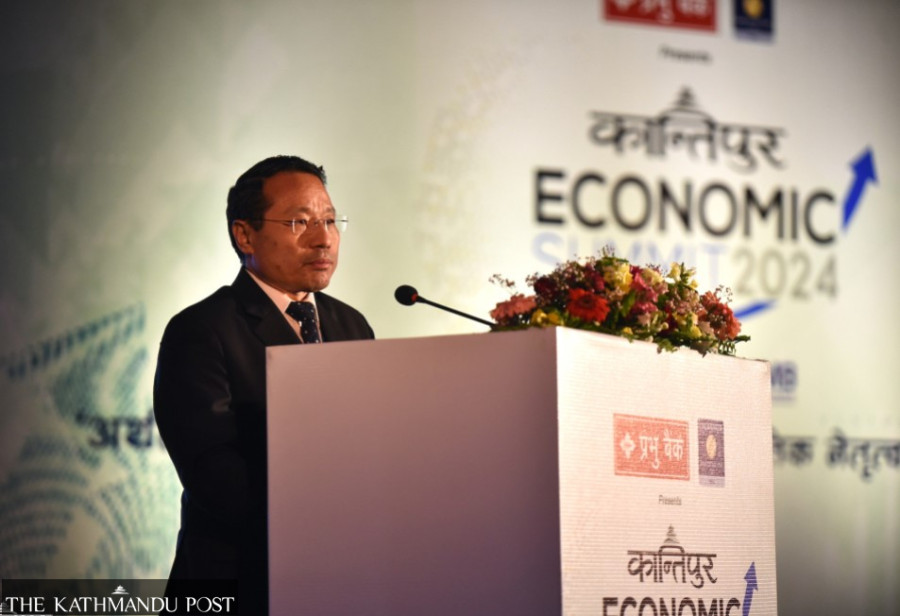Money
Finance Minister Pun stresses need for critical analysis of the country’s state
Representatives from business community decry policies unfavourable for investment promotion.
Post Report
Finance Minister Barshaman Pun on Sunday said that there was a need for critically analysing the state of the country.
Speaking at the fourth edition of the Kantipur Economic Summit organised by the Kantipur Media Group, Minister Pun underscored the need to correct past mistakes and to review the shortcomings of the political parties and their leaders.
“The overall situation of the country needs to be critically analysed. But that doesn’t mean that everything is bad and unsatisfactory,” Pun said. “Despite not being able to work to our full capacity, we have witnessed good progress in the hospitality and hydropower sectors among others, even during an economic slowdown.”
The finance minister also said that the central and provincial governments had failed to coordinate, resulting in a failure to spend the money as allocated in the fiscal budget.
While the state coffers fall short of Rs161 billion, the provincial and local bodies have been failing to spend Rs246 billion, Pun said. “We could not work in coordination.”
He also admitted that the government had failed to invest in the construction industry, resulting in negative growth in the sector and slowed business.
“This issue is understandable and not to shift blame to others. It is for the government to take care of.”
Nepal Chamber of Commerce President Kamlesh Kumar Agrawal noted that the situation of the construction industry and the private sector was concerning.
Agrawal claimed that the private sector, considered to be a key driver of the economy, had become sluggish due to restraints in the policies.
The Nepali economy, which thrived even during the 2015 earthquake, India’s blockade, the Covid pandemic, and the Russia-Ukraine war, has now slowed down to policies that are unfavourable for investments, Agrawal said.
The government policies, which are more stringent than required, have also negatively affected the morale of the industrialists, said Chandra Prasad Dhakal, president of the Federation of Nepalese Chambers of Commerce and Industries.
“The government took unnecessary precautions fearing a similar fate as that of Sri Lanka, which faced an economic crisis after the Covid pandemic. This not only impacted the private sector but resulted in a downfall in revenue collection,” Dhakal said. “The next budget should be formulated to increase the confidence of businesses and the general public.”
According to Rajesh Kumar Agrawal, president of the Confederation of Nepalese Industries, the lack of investment and employment opportunities has also led to even business owners leaving the country.
Adding to the mass exodus of Nepali youths, people operating small-scale businesses have also been compelled to leave the country due to unfavourable government policies, the CNI President said.
In such a condition, the country has reached a state of having to rejoice in an increase in remittance, he added.
“There is a necessity to develop a strategy to identify the goods and products deserving policy incentives,” Agrawal said.
Likewise, Upendra Mahato, president of the Non-Resident Nepali Association, stated that the government had failed to realise the investment potential of the non-resident Nepalis.
Besides sending remittances, the NRNA, which hosts approximately 6 million members, is also capable of investing in the country, Mahato stressed.
The Nepal-NRN fund, jointly formed by the Nepali government and the NRNA, has a potential to bring in funds worth billions of dollars, but has not been able to do so, Mahato said.
“The government is eager to take funds, but going through the official procedures is tedious,” Mahato added.




 9.83°C Kathmandu
9.83°C Kathmandu














